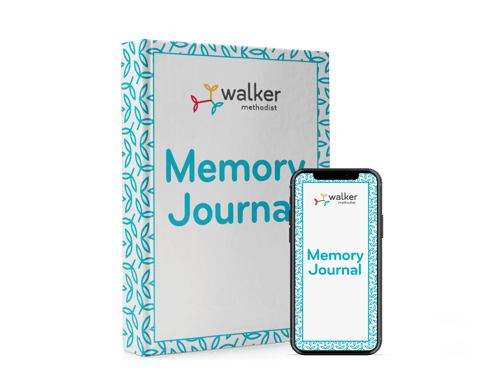How to Use a Memory Journal
Sarah Benbow, Executive Director of Communications | Sep 14, 2022
Your memories are unique to you. As you age, memory journals can be a fulfilling way to relive adventures, capture your experiences, and preserve your memories for your family as a keepsake.
Memory journaling can feel like a simple way to record experiences. But this form of journaling also has social and health benefits, especially as we age.
Keeping a daily memory journal
Keeping a daily journal in which you write down memories not only creates a way to hand down your memories to the ones you love, but it can help:
- Improve your working memory
- Reduce stress and depression
- Tap into old memories
- Emotionally process past events

Memory studies show journaling improves health
Similar to playing or listening to music, studies have shown that journaling in any form helps improve memory retention and cognition. These same studies have shown that writing things down improves mood, can help regulate emotions, and leads to better health overall.
Even intermittently journaling can improve your quality of life. So don’t put too much pressure on yourself to write every day or for a certain period of time — though you might adopt such habits as you continue journaling over time.

The tie between memory & cognition
What we remember about our past helps us shape our future. When your brain retrieves a memory, it can help activate and improve cognition. And writing something down forces your brain to help you remember the information. Every memory you record is a way to keep those details stored in your memory for later recall.
While memory recall development has been shown to strengthen if writing something down by hand, there are still benefits if it is easier and more comfortable to use a computer or other electronic device to keep your journal.
What should be included in a memory journal?
Memory journals can be a place for any memory you want to document, cherish, or pass to your family. You can choose to start from birth, or pick and choose what parts of your life you’d like to include. Maybe your memory journal will only be about a specific time in your life — there’s no right or wrong way to write your journal.
For someone thinking about or just starting a memory journal, we recommend starting with:
- Your birth and background
- Childhood and teenage years
- Student life
- Love, marriage, and adulthood
- Work, living, and community
- Living life
- General “about you”
Every person’s memory journal looks different, and there are no real rules for how to write your memories. Having trouble getting started? Just start writing and see where it takes you!
Download your free memory journal
Our free memory journal makes it easy to start recording your life to pass to your children or grandchildren. With seven chapters already prepared for you, starting has never been easier — all you have to do is download the journal and put pen to paper.


